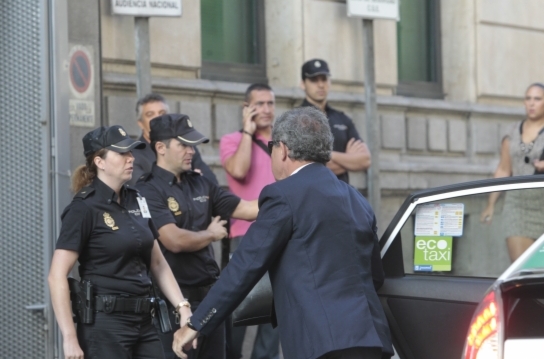17.09.2014 - 20:27
The judicial process for alleged tax fraud against family members of the former President of Catalonia Jordi Pujol (who led centre-right Catalan nationalism from the mid-1970s until 2003) has started this week with the testimony of his oldest son, Jordi Pujol Ferrussola, in front of the Spain’s High Court ‘Audiencia Nacional’. Judge Pablo Ruz is investigating the tax fraud confessed by Pujol senior in late July, a confession that shocked the whole of Catalan society. The case is related to alleged money laundering, influence peddling and corruption offenses that might have been committed by some of Pujol’s sons, who are also being investigated. Pujol Senior had always been an advocate of greater self-government for Catalonia, but remaining within Spain. However, in the last two year, he started to publicly support independence. There are increasing news indicating that Spanish authorities already knew about Pujol’s financial issues but covered him up in exchange for his opposition to independence and for keeping the movement marginal in the 1980s and 1990s. This summer, after increasing reports and investigations targeting his sons and daughters, Pujol confessed that his family had being hiding a fortune abroad for 34 years, without ever declaring it to the tax authorities. In addition, in the last two years there have been many reports and rumours, not yet confirmed, that link Pujol’s oldest son to shady businesses and hidden bank accounts in foreign countries such as Argentina, Mexico, Luxembourg, Croatia, Andorra and Switzerland. Because of the complex nature of the case, and its international repercussions, it is being investigated by the Madrid-based ‘Audiencia Nacional’. In addition, the former President will go to the Catalan Parliament next week to provide further explanations about his confession from July.
This Monday, Jordi Pujol Ferrusola, the oldest son of the former President Jordi Pujol (who chaired the Catalan Government between 1980 and 2003) testified for five hours in front of Madrid-based ‘Audiencia Nacional’, Spain’s High Court investigating terrorism, organised crime and cross-border financial crime. Judge Pablo Ruz has been investigating him since December 2012, after the statements made by Pujol Ferrussola’s former girlfriend, Victòria Álvarez, and a prominent businessman in the 1980s and 1990s, Javier de la Rosa. Pujol Ferrussola is indicted of money laundering and tax fraud, which could also include corruption and influence peddling offenses. His former wife, Mercè Gironès, is also indicted, since they were running several companies together. According to judicial sources, Pujol Ferrussola answered all the questions from the judge for four hours and to those from the Prosecutors’ Office and the Spanish Government’s Lawyer.
Jordi Pujol Ferrussola denied having earned any illegal commission in business operations involving public tenders, according to judicial sources. Furthermore, he pointed out that the tenders in which he worked as an advisor or mediator were all carried out at least 2 years after his father left the Catalan Government. On top of this, he said that many of these bids were issued by municipalities run by the Catalan Socialist Party (PSC), which used to be the main opposition party to his father’s governments. Pujol Ferrussola also criticised the financial reports drafted by the Spanish Police for being vague and inexact. These documents were listing a long series of tax offenses that he might have allegedly committed.
The Spanish Police pointed out in several reports that the couple had moved €32 million in foreign currencies between 2004 and 2012. According to these documents, through 17 different companies and trading societies, the Pujol-Gironès couple might have earned €8 million in illegal commissions. The two main companies that would have paid such money would be the construction firms Copisa and Isolux Corsán, stated the Spanish Police. According to the reports, the money was paid for “inexistent advising services”.



